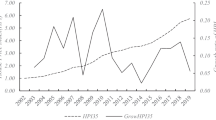Abstract
The buying and selling of real estate is predominantly conducted through transactions agents: real estate brokers. In recent decades, there have been divergent trends in commercial and residential markets. Commercial brokerage firms have become involved in a wider range of services and have internationalised; in contrast, residential firms have remained nationally, and predominantly locally, based and still concentrate on brokerage. Economic explanations are used to understand this experience. This case study highlights a weakness of arguments that globalisation is inextricably taking over more facets of life. Higher incomes are associated with a growing preference for services, many of which are best delivered locally or in a decentralised way.
Similar content being viewed by others
Notes
Property management has been a growing area in countries, like the UK, where a free-market private rental sector has come into existence in recent years.
For evidence from the UK and elsewhere, see office of fair trading (2004). Estate agency market in England and Wales. Office of Fair Trading: London.
Access to relevant firm data is the prime constraint on rigorous studies of scale and scope economies.
There is no definitive data on total turnovers in these markets.
In addition, commercial real estate oriented property services companies through their management services operations may be involved in the management of residential properties, especially large city centre apartment blocks.
These corporate histories are derived from the firms’ websites.
It is interesting to note that this investment of Mitsubishi estate is the only case of Japanese firms being involved in the global changes in real estate service providers. It is possible to speculate that this may have something to do with the ownership of Japanese real estate, which is more likely to be owner occupied than in the UK or USA (the same is true of other major economic powers, like France and Germany), and also with the impact of the long recession in the Japanese real estate market, which has put Japanese real estate firms in a relatively weak international position.
Although overall commercial owner occupation rates are still high—50% in the USA, for example, according to one estimate (Deng & Gyourko, 2002). Real estate returns by non-real estate firms: an estimate of the impact on firm returns. Wharton real estate working paper: Philadelphia.
See, for example, CB Richard Ellis’ Annual Report 2004.
One US study does exist from the 1980s.
References
Ball, M. (2003). Is there an office replacement cycle? Journal of Property Research, 20(2), 173–189.
Ball, M., Lizieri C., & MacGregor, B. D. (1998). The economics of commercial property markets. London: Routledge.
Becker, R. (2005). Companies, does size matter? In S. Swanepoel, & T. Dooley (Eds.) Real estate confronts the future. New York: Thomson Learning.
Deng, Y., & Gyourko, J. (2002). Real estate returns by non-real estate firms: an estimate of the impact on firm returns. Wharton Real Estate Working Paper: Philadelphia.
Findlay, J. F., & Gibb K. (1998). The pricing of real estate agency and conveyancing services in Scotland. Journal of Property Research, 15(2), 135–15.
Johnson, L. a. K. T. (1993). An industry profile of corporate real estate. Journal of Real Estate Research, 8, 525–540.
Smith, A. (1776). The Wealth of Nations. Wealth of Nations (pp 1–3) (1979 ed.). Harmondsworth, UK: Penguin Books.
The Monopolies and Mergers Commission (1997) Solicitors’ estate agency in Scotland. A report on the supply of residential estate agency services in Scotland.
Trading O. o. F. (ed) (2004). Estate agency market in England and Wales. London: Office of Fair Trading.
Yavas, A. (1994). Economics of brokerage: an overview. Journal of Real Estate Literature, 2, 169–195.
Zumpano, L. V., & Elder, H. V. (1994). Economies of scope and density in the market for real estate brokerage services. American Real Estate and Urban Economics Association Journal, 22, 497–513.
Zumpano, L. V., Elder, H. V., & Crellin, G. E. (1993). The market for residential real estate brokerage services: costs of production and economies of scale. Journal of Real Estate Finance and Economics, 6, 237–250.
Author information
Authors and Affiliations
Corresponding author
Rights and permissions
About this article
Cite this article
Ball, M. Localisation versus globalisation: some evidence from real estate services organisations. J Housing Built Environ 22, 91–106 (2007). https://doi.org/10.1007/s10901-006-9073-2
Published:
Issue Date:
DOI: https://doi.org/10.1007/s10901-006-9073-2




